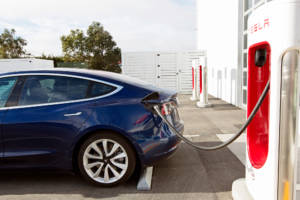 Elon Musk’s American automotive company Tesla is working on building its own battery cells and it is doing so at a “secret lab” near Tesla’s factory in Fremont, Calif., according to CNBC.
Elon Musk’s American automotive company Tesla is working on building its own battery cells and it is doing so at a “secret lab” near Tesla’s factory in Fremont, Calif., according to CNBC.
On June 26, the outlet reported that five current and recent employees have confirmed that the electric vehicle company is looking to stop relying on Panasonic for its battery cells. Tesla signed an extensive partnership deal with the Japanese corporation in 2014.
And while the company has not publicly confirmed this information, the move to an in-house battery cell production could help Tesla offer cheaper, higher-performance electric vehicles than it does today, since the company would no longer have to pay or share data and resources with outside vendors or partners.
Currently, the 2018 Tesla Model S starts at around $75,000, but the cars’ MSRP range is up to $136,000, according to Kelley Blue Book. According to research by IHS Markit, Tesla’s battery pack and battery cells are the biggest cost component in an electric vehicle, reports CNBC. Therefore if the cost of the battery pack and battery cell is less, the price of the car may be less as well.
In June, Musk admitted at the company’s annual shareholders meeting that the company has been “battery-constrained” in the past, which means a lack of batteries has kept down Tesla’s production and sales of electric vehicles and energy storage systems (Powerwalls and Powerpacks).
Tesla’s in-house battery cells would also be in keeping with Musk’s desire to make his company “vertically integrated.” The technology entrepreneur has expressed a desire to develop, manufacture and sell everything it can itself, including its own enterprise software.
However, the decision to try to manufacture cells at a high volume may pose serious problems to a company that recently implemented cost-cutting measures and is still struggling to perfect its high-volume vehicle production.
The outlet reports that Tesla employees tasked to conduct battery cell manufacturing research at a “skunkworks lab” at the company’s Kato Road facility, which is close to its car plant, where it makes its Model 3, Model S and Model X vehicles today.
Currently, Tesla’s batteries are made at the Gigafactory in Sparks, Nevada, a factory that is jointly owned and operated with its partner Panasonic.
Former and current employees told the outlet that Tesla’s battery R&D teams are said to be looking at designing and prototyping advanced lithium-ion battery cells. The company is also focusing on new equipment and processes that night help Tesla produce cells in high volumes.
The evidence does seem to point toward Tesla’s desire to produce batteries in-house. Last month, Tesla posted listings for various engineers jobs involved in battery cell design, equipment for producing battery cells and battery manufacturing processes.
However, even if Tesla is successful at producing batteries, that doesn’t mean the company will sever ties with Panasonic or other battery suppliers any time soon.
The company would likely work with Panasonic and LG to provide battery for the Model 3 vehicles produced in its Shanghai factory. Production in the Shanghai factory is supposed to begin by the end of 2019 and mass production is set to start in the beginning in 2020.
Meanwhile, Musk sent one of his famous “everybody” emails to his staff of thousands on June 25, encouraging them to push to hit second-quarter goals.
Musk wrote, “As you may have noticed, there is a lot of speculation regarding the vehicle deliveries this quarter. The reality is that we are on track to set an all-time record, but it will be very close. However, if we go all out, we can definitely do it!”
He continued, “We already have enough vehicle orders to set a record, but the right cars are not yet all in the right locations. Logistics and final delivery are extremely important, as well as finding demand for vehicle variants that are available locally, but can’t reach people who ordered that variant before end of the quarter.”
The idiosyncratic engineer finished the email: “I have great faith in you. Please let me know if there is anything I can do to help.”
Tesla and Panasonic did not respond to CNBC’s requests for comment.

